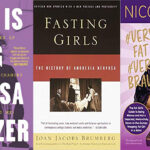
Why Ted Kennedy Never Became President and Why Jimmy Carter Served Only One Term
Camelot’s End is not a scholarly book. But it is a solid, journalistic account of an important moment in the history of the Democratic Party and the United States.

Camelot’s End is not a scholarly book. But it is a solid, journalistic account of an important moment in the history of the Democratic Party and the United States.

A reader primarily interested in an exhaustive account of policy specifics or in Reagan’s position in the longer arc of American political history might do better with other biographies, or with the several excellent historical works addressing the broader context of the Reagan presidency. But for the reader primarily interested in a single biography about Reagan the man and Reagan the politician, and moderately serious about following details of his statesmanship, An American Journey would be a rewarding choice—entertaining, evenhanded, and historically rich.

Goddess of Anarchy recovers not only Lucy Parson’s story, but also provides a window onto the richness of Chicago’s radical culture and a broader national network of labor activists in the early twentieth century.

In Star Theatre, William Firebrace, as the architect that he is, provides the reader with an excellent assessment of some of the most interesting planetarium buildings in the world. He also walks us through the unique history of the human desire to bring the heavens down to Earth.

I leave it to social historians to draw comparisons with other identity movements, but it can be hard to bridge the gap between accepting fatness in others and accepting it in yourself—and waiting for the rest of the world to catch up.

Curzio Malaparte’s ferociously ambiguous politics pushed him in and out of Il Duce’s prisons in the 1930s, yet they also rehabilitated him sufficiently to grant him access to Axis military and diplomatic operations as a journalist during the war. And when the winds shifted again, he trimmed his sails, finding work with occupying U.S. forces in Italy after Mussolini’s collapse.

While The Other Americans makes for a compelling read with its digestible chapters, its alternating perspectives, and its many layers, an overly ambitious scope means that some of the subjects it tries to tackle receive scant attention.

Susan Berfield’s book reads like a novel and she proves the adage that truth can be just as engaging as fiction. This is no small feat given that there are extensive discussions of century-old legislation and litigation, which only a true antitrust nerd can love.

Be it Hughes and Hurston, Baldwin and Wright, or Tupac and Biggie, burdened friendships are a recurrent and disturbingly alluring theme in the study of Black writers. Yet, if it is the dramatic bite of high-profile betrayal that tends to ignite a hot-selling story, in the case of Zora and Langston it is the dynamics of friendship that provide a happy counterexample.

Addis offers a dark view of Rome’s history, in which historical change comes about not through high-minded actions or progress, but rather through brutality, ruthlessness, and accident. This is a healthful antidote to the triumphalist histories, acclaiming the expansion of the Roman Empire, the rise of Christianity, Italian nationalism, or Western civilization, of which the city of Rome has sometimes been the center.